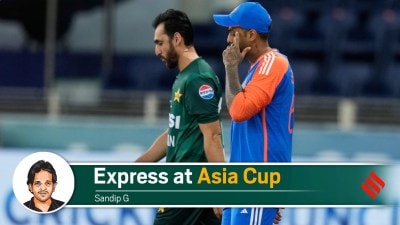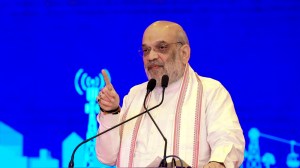Congratulations, Mr Ram Naik
Chances are, if you have visited a petrol pump in the last one week — a period after the sector was freed from government controls ...

Chances are, if you have visited a petrol pump in the last one week — a period after the sector was freed from government controls — you would have found nothing changed. The service was as bad and, not only had prices not changed, they were the same across outlets belonging to different companies. If you were not so fortunate as to live in the VVIP parts of the Capital, it was also likely the petrol or diesel you were buying was still adulterated — oil company officials will tell you that, especially on the highway outlets, adulteration levels cross even 50 per cent in the case of diesel sales.
Having tanked up your car now, drive down to the offices of the public sector oil companies that were also supposed to have been freed on All Fools Day (maybe that’s why nothing really changed!), and you will find the farce continuing. You will find an oil ministry directive there, asking these firms — IOC, HPCL and BPCL — not to hike prices. Since global crude prices have jumped in recent weeks, a genuinely free market would have meant a rise in the prices of petrol and diesel. So the oil firms will now meet once in two or three months to review matters and then decide on a common price.
This, by the way, is called cartelisation in most countries, except, in this case, the government is legitimising it. And, in this instance, with crude prices now $28 a barrel, the cartelisation is being done to ensure retail prices don’t go up — the losses are being shared by the PSU oil firms. In contrast, pure refining firms like private sector Reliance Petroleum are to be paid global prices for their petroleum products — based on today’s prices, this means Reliance will get paid around Rs 1,500 crore more in a year than the PSU firms get.
But wasn’t Reliance trying to set up its own sales outlets? After all, if Reliance is there, how can the PSU oil firms cartelise? The answer lies in a logic only a politician or a bureaucrat can understand. Everyone in the oil business knows it takes around two years to set up a decent-sized sales network, and it was also known the oil sector was to be freed on April 1, 2002. So, logically, firms like Reliance should have been allowed to start setting up their outlets two years ago, right? Well, the government’s view was permission should be given only after All Fools Day this year, effectively keeping competition at bay for another two years. Reliance, by the way, has signed an agreement to exclusively sell its products to IOC/HPCL/BPCL for another two years — clearly pump-level prices aren’t going to change much till then.
But if prices aren’t changing, what was the rationale for freeing the oil sector? Well, when deregulation was originally conceived, it was estimated efficiency levels would go up by between five and 10 per cent as a result, and so around Rs 20,000 crore would filter down to consumers through lower prices. Just by way of an example of the efficiency differentials, Reliance, for instance, manages to buy its crude oil at around $2-3 a barrel less than the public sector IOC does.
Reliance officials, you see, are constantly scouting for the best deals across the world, including keeping an eye on even distress sales on the high seas. Deals will be made with countries such as Venezuela — whose crude is not as good — to drive down prices from even Middle East suppliers. Do you know that even to haul its crude all the way from Venezuela, Reliance pays just a fraction more than IOC does for its purchases from the much-closer Gulf? IOC, by contrast, has to follow well-publicised rules for buying its crude, and calls for bids which are then scrutinised by a team comprising even various joint secretaries in the government. You can now see why it just can’t compete with Reliance. As part of the post-freedom rules, HPCL is now going to buy its own crude (IOC did all the buying earlier), but its procurement procedures are the same as IOC’s!
It gets worse. While the oil PSUs are theoretically free from the ministry of petroleum’s diktats, do you know they are not even free to appoint their own dealers? The ministry has appointed boards to select around 6,500 or so dealers for them, based on criteria like economic and social backwardness and so on. (The ‘so on’, incidentally, stands for political and other considerations!) And once the ministry has helped appoint a dealer, it is loath to let the oil company dismiss the dealer. There are several instances — some even as late as last year — where the oil companies dismissed dealers who were caught adulterating petrol/ diesel, but they were subsequently reinstated by the ministry. The marketing discipline guidelines issued to take care of precisely this, have in fact been diluted several times over the past few years, making it nearly impossible to terminate dealerships with people who make their crores mixing God-knows-what in your petrol or diesel. This is what passes for deregulation.
But let’s end on a happy note. After all, someone must have benefitted from the deregulation. Oil minister Ram Naik has. You see, till All Fools Day, the subsidy given to consumers (through below-cost pricing of kerosene and LPG, among others) was borne by the oil companies in the form of the oil pool deficit. Technically, then, the deficit lay at Naik’s door. This has now been transferred to Finance Minister Sinha’s budget. Congratulations, Sir!
Photos





- 01
- 02
- 03
- 04
- 05


























